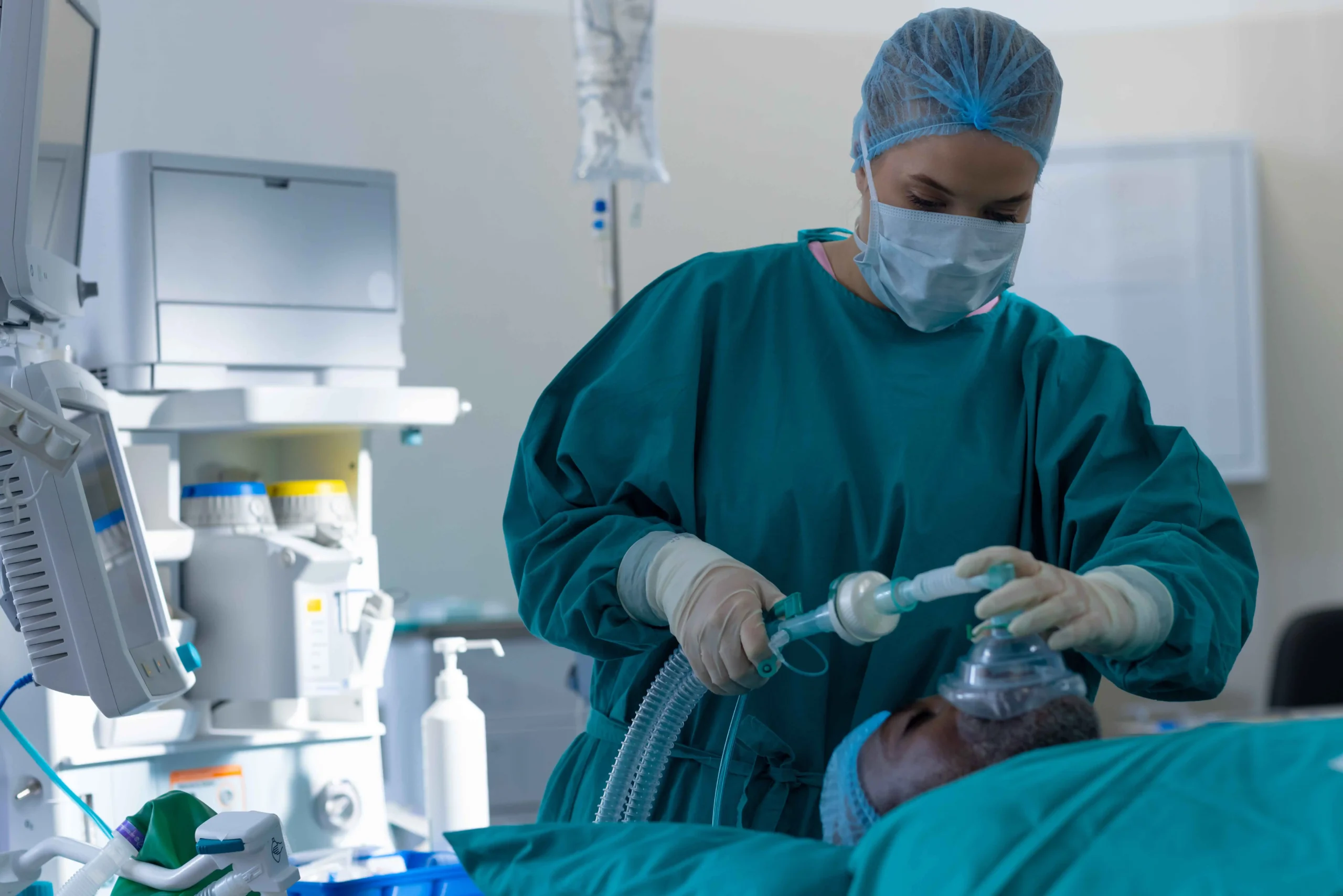How to Become an Anesthesiologist
When considering career choices do you wish to improve your patients’ well-being through significant accomplishments? If yes, becoming an anesthesiologist might be the perfect choice for you. Anesthesiologists give anesthesia to patients during surgeries and help them experience both safety and comfort benefits.
Have you ever questioned what the path looks like to become an anesthesiologist? This roadmap delivers both basic guidelines and essential educational prerequisites alongside the professional expertise needed for anesthesiologist success.
Who is an Anesthesiologist?
Anesthesiologists are distinguished from general physicians by their special training in college and expertise in anesthesia-based patient care and sedation. They assess surgical candidates through testing procedures, allowing healthcare providers to execute anesthesia safely while monitoring vital signs to protect surgical conditions and patient comfort. Furthermore, Anesthesiologists also conduct postoperative pain control and provide essential medical attention in vital hospital areas such as intensive care units and maternity facilities.
Why Pursue a Career in Anesthesiology?
Anesthesiology combines respected professional skills of patient care with technical medical knowledge. Here are some reasons to consider this career:
1. Critical Role: Surgical procedure safety entirely rests upon the fundamental services that anesthesiologists deliver to patients.
2. High Earning Potential: The typical earnings of an anesthesiologist span between $300,000 and $450,000 annually but physicians focusing on specialized disciplines can build their income above this range.
3. Diverse Work Settings: Anesthesiologists work in diverse medical spaces, including operating rooms and critical care units.
4. Career Stability: The profession continues to experience sustained demand because anesthesiologists demonstrate high job stability and opportunities for professional advancement.
Skills Required for a Successful Career
To excel in this field, aspiring anesthesiologists should develop key skills such as:
- Strong decision-making abilities under pressure
- Excellent communication and teamwork skills
- Attention to detail and precision
- Deep knowledge of pharmacology and physiology
Key Steps to Be an Anesthesiologist
Individuals interested in entering anesthesiology might think of how to become an anesthesiologist. Achieving this goal follows a complete road map of various steps, let’s explore how to become an anesthesiologist!
Step 1: Earn a Relevant Undergraduate Degree
Students can choose any major, however pre-med programs in science studies, including majors in anesthesiology, biology, chemistry, and biochemistry, represent the most common paths.
Key tips for this stage:
- Students must keep their GPA at 3.5 or higher because medical school admissions are fiercely competitive. To succeed on the Medical College Admission Test (MCAT), students should study abstract knowledge in advanced biology, organic chemistry, physics, and mathematics.
- Additionally, physicians encounter valuable medical insight through free hospital work doctor observation sessions and clinical internships at healthcare centers. Addíng these experiences to your application strengthens it while showing you how much you love this career direction.
- Complete healthcare exposure starts with hospital volunteering physician shadowing or time spent interning within medical facilities. Exposure to these experiences builds strength in your medical school application.
Step 2: Pass the MCAT
Most American medical schools demand applicants pass the standardized MCAT test for entrance. The MCAT evaluates your understanding of biological and physical sciences alongside your problem-solving abilities and analytical capabilities.
How to prepare:
- Spending 6 months to 4 months is necessary for achieving MCAT preparation goals. A combination of prep books paired with online courses and practice exams completes your study materials for success.
- Therefore, your goal should be an above 510 competitive score to win a spot at top-tier medical schools.
- When you’re prepping for the MCAT it does help to dive deep into the content of the four main sections. For that, you will want to lay down a good foundation in the Biological and Biochemical Foundation, and the Chemical and Physical Foundation.
Step 3: Attend Medical School
Throughout its four years medical school exposes students to classroom teaching and practical clinical work.
Years 1 and 2: Students must learn essential subjects, including anatomy and pharmacology with pathology and medical ethics. Your medical studies will consist primarily of lecture rooms, lab work, and interactive small-group settings.
Years 3 and 4: Students will participate in clinical rotations in hospitals and clinics after completing classroom study. During medical school years, you get to analyze a variety of specialties to check which field best fits your chosen career path.
Tips for medical school success:
- Because medical courses have high difficulty levels you should establish reliable study methods and schedule management abilities to succeed.
- Find mentors in medical school to create beneficial partnerships for guidance in obtaining residency acceptance through recommendation endorsements.
- Further, engaging actively with anesthesiology-related rotations will increase residency program application success for future applicants.
Step 4: Complete an Anesthesiology Residency
Acquiring your medical degree must be followed by four years of anesthesiology residency training. Anesthesia management techniques and patient surveillance expertise represent the core competencies that this extensive clinical training teaches its participants.
Key areas of training:
Year 1 (Internship): Medical training in the first year teaches doctors fundamental knowledge across internal medicine through surgery and emergency medicine practice.
Years 2–4: The training focuses on anesthesiology specifics during this period aspiring doctors must learn how to monitor patients administer pain treatments and control medical crises.
Additionally, students must gain practical skills by working in operating rooms, intensive care units, and outpatient surgery facilities.
How to excel in residency:
- Ensure you stay prepared for learning opportunities by organizing your work beforehand.
- Gain professional relationships with senior residents and attending physicians to benefit from their clinical expertise.
- Your CV will also be enhanced when you join research projects and this involvement lets you investigate subspecialty areas.
Step 5: Obtain Licensing and Certification
To practice as an anesthesiologist, you must:
1. Pass the USMLE: Medical knowledge testing and clinical skill assessment constitute this examination at multiple steps.
2. Obtain a State License: All states require USMLE exam success and an application submission.
3. Earn Board Certification: Your expertise as an anesthesiologist receives official recognition through certification from the American Board of Anesthesiology (ABA). Thus, Passing the Basic, advanced and applied exams qualifies you to begin your work in anesthesiology.
Ongoing Requirements:
Moreover, to keep your board certification active you should engage in continued medical education and face periodic examinations for recertification.
Step 6: Explore Subspecialties (Optional)
To build expertise in a particular area select a fellowship program after completing your residency if that’s your plan. Fellowships typically last 1–2 years and provide advanced training in fields like:
- Pediatric Anesthesia: Anesthesia care professionals within the field exclusively with child patients for medical pain treatment.
- Pain Medicine: Pain management providers supervise the treatment of ongoing pain and quick-onset pain attacks.
Job Outlook and Salary
Major healthcare organizations predict expanding demand for anesthesiologists and increasing career possibilities through the following years. Anesthesiologists’ salaries range between $250,000 and $400,000 yearly as their base compensation. Your work setting and experience determine the exact amount you will earn.
Even anesthesiologist assistants who work with them secure stable compensation from this field because physician assistants deliver patient care alongside anesthesiologists. Therefore, the profession shows promising signs for practitioners, and it is expanding.
Challenges of a Career in Anesthesiology
While anesthesiology offers many benefits it also comes with challenges such as:
- Medical professionals work extended periods with difficult schedules which is most prominent in hospital environments.
- High levels of responsibility and stress especially in emergencies
- Professionals in this medical field should pursue continuous education to stay updated with new medical discoveries.
Conclusion:
Practicing anesthesiology demands a multidimensional commitment that leads to a fulfilling career. This guideline provides step-by-step guidelines on how to become an anesthesiologist which will help you bring out substantial career and life fulfillment.
FAQs
Is a Career in Anesthesiology Good?
Undoubtedly, individuals who choose anesthesiology as a career might have the opportunity to earn high salaries, have stable work, and make significant contributions to healthcare outcomes.
How Can You Become an Anesthesiologist in the USA?
Following medical school completion, you need to enroll in a four-year residency program in anesthesiology to achieve a career in this field. Mandatory residency serves as the main source to acquire specialized training vital for this profession. After completing your residency you will qualify to take the American Board of Anesthesiology (ABA) exam. Board certification becomes achievable for around 75% of physician anesthesiologists indicating deep dedication to this medical profession.
What degree do you need to become an anesthesiologist, and how can you prepare?
To pursue a career in anesthesiology you must hold a Doctor of Medicine (MD) degree or Doctor of Osteopathic Medicine (DO). Successful preparation for anesthesiology requires students to achieve top scores in science-based undergraduate academics while investigating clinical settings and excelling on the MCAT. With a Liberal Arts degree background, you can fulfill medical school prerequisites through pre-med coursework.



